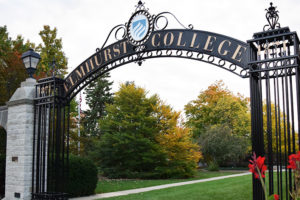
Ross Douthat is not the first newspaper columnist to suggest that the United States is mired in a social and economic slump.
His recipe for rejuvenation, though, is novel. Douthat, the author of Bad Religion: How We Became a Nation of Heretics and a New York Times columnist, argues that America needs a revitalized mainstream Christianity.
Douthat told an audience at the Frick Center on October 11 that the United States remains a nation of believers and spiritual seekers. The problem, as he sees it, is that Americans have stopped turning to traditional Christianity for answers. Instead, they have embraced what Douthat bluntly calls heresies—popular varieties of pseudo-Christianity that appeal to the self-absorbed.
“The trend toward individualism is worrying,” Douthat said. “You see it whether you look at the church of Joel Osteen or the church of Oprah Winfrey. We are self-satisfied in the red states and self-regarding in the blue.”
Douthat spoke as part of Elmhurst’s third annual Niebuhr Forum on Religion in Public Life. He began by describing a mid-20th-century world in which mainline Christianity held a central place, offering common ground for the most important national conversations. It was a time, Douthat said, when Christianity was at its peak of popular and intellectual influence. Church attendance rates were high and climbing, Hollywood was churning out Biblical epics, and Christian intellectuals like Reinhold Niebuhr appeared on the cover of Time magazine.
Niebuhr, the theologian and Elmhurst alumnus (class of 1910) for whom the forum is named, was an exemplar of Christian thought’s central place in national life, Douthat said.
“Niebuhr was a species all but lost to us today—the public theologian,” Douthat said. “He was a kind of universal intellectual,” embraced by those on both the left and the right of the political spectrum.
But by the 1960s, the robust Christian center that Niebuhr represented would begin to wane in influence. Douthat argued that the decline was not caused by increasing secularism, as is often suggested. Rather, he pointed out, even as church attendance in mainstream Protestant congregations plummeted through the 1970s, belief in God remained constant or grew.
“In fact, in some ways the 1960s and 1970s resembled a kind of Great Awakening, with all of society seeming to go on a spiritual search, whether through pharmacology, crystals or mysticism,” Douthat said. “There was clearly still a hunger for the numinous and the transcendental.”
And yet American seekers in recent decades have turned less and less frequently to traditional Christian churches. Instead, Douthat argues, a “lite” version of Christianity has taken root. In Bad Religion, he takes aim at the prosperity gospel, which preaches that believers will grow rich through prayer; and at popular books like Elizabeth Gilbert’s Eat, Pray, Love, which he says reduce spirituality to narcissism.
“The heretics carried the day,” Douthat told his audience at Elmhurst.
Douthat was 29 when he joined the Times in 2009, making him the youngest opinion columnist in the paper’s history. In an interview before his lecture, he said that Bad Religion began as a response to arguments that American society was becoming secularized.
“I saw an alternative story, not about the rise of secularism but about how America remained religious without being truly Christian,” he said.
For Douthat, the decline of the Christian center has left a vacuum in American life.
“Traditional Christianity historically has provided common ground,” he said. “It has been a tremendous force for good in American life.”